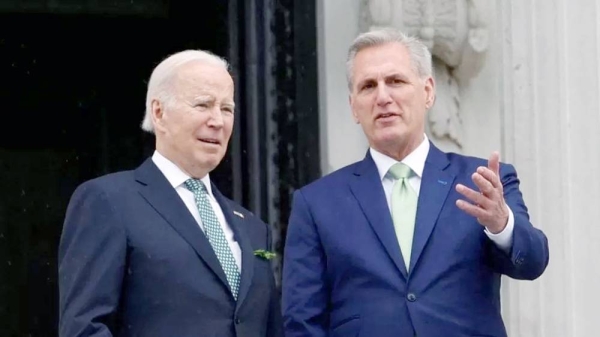
WASHINGTON (Reuters) -U.S. Senate Majority Leader Chuck Schumer said on Wednesday he did not believe Republicans would let the United States default on its debt as the government approaches its borrowing capacity, warning such a lapse would be perilous for the country.
Dozens of Republicans have signed a pledge not to raise the debt limit, in an effort to curtail Democrats who passed a $1.9 trillion COVID-19 relief bill in March and this week floated a $3.5 trillion bill on other spending priorities.
A $1 trillion infrastructure bill that passed the Senate on Tuesday garnered 19 Republican votes.
“I cannot believe the Republicans will let the country default, and it has always been bipartisan to deal with the debt ceiling,” Schumer told a news conference, noting Democrats backed debt limit increases three times under Republican former President Donald Trump.
“For Republicans to say they will never do it is typically irresponsible,” House of Representatives Speaker Nancy Pelosi told House Democrats, according to a source familiar with their conference call.
Treasury Secretary Janet Yellen again cautioned lawmakers this week about the economic harm facing the country if the debt limit is not addressed before the federal government’s borrowing capability is exhausted in October.
Failure to increase or suspend the statutory debt limit - now at $28.5 trillion - could trigger another federal government shutdown or a debt default.
White House spokeswoman Jen Psaki reiterated a call for Congress to unify and raise the debt ceiling as President Joe Biden defended his spending proposals as being paid for without borrowing.
Republican Senate leader Mitch McConnell and other conservative lawmakers are seeking to tie action on the debt ceiling to Biden and his fellow Democrats, who control the Senate, even as Yellen noted much of the debt accrued fell under previous administrations.
U.S. borrowing swelled by almost 40% to nearly $28 trillion under Trump, fueled by the passage of tax cuts in 2017 and coronavirus-related spending in 2020.
“They didn’t even try to pay for their tax cuts,” Biden told reporters at the White House, saying his investment priorities will “be fully paid for. ... That means we’ll actually reduce the national debt, improve our fiscal position over the long run.”
Pelosi, in her call to members, cited a shared responsibility to pay for Trump’s tax cuts and efforts to fight the pandemic, saying: “This is about money already spent,” according to the source.
The U.S. Treasury reported on Wednesday a record $302 billion federal government budget deficit for July.
Reporting by Susan Cornwell and Susan Heavey; Additional reporting by Jeff Mason and David Lawder; Editing by Marguerita Choy and Peter Cooney
Our Standards: The Thomson Reuters Trust Principles.









